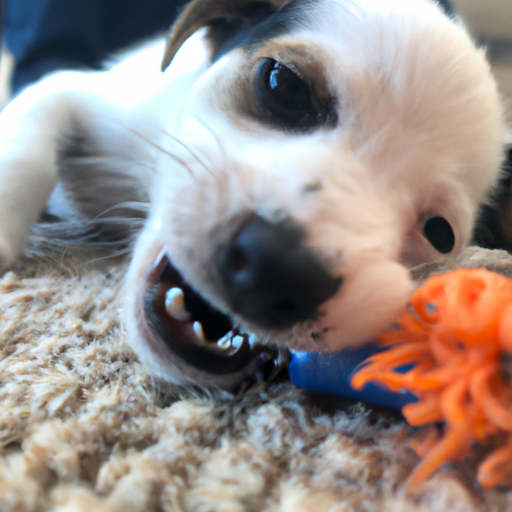Understanding Puppy Teeth
You might not expect it, but just like human babies, puppies have their own set of baby teeth. As a caregiver, understanding these baby canine teeth is crucial to your pet’s health and happiness.
Puppies are born without teeth. However, by the time they reach three weeks old, their baby teeth (also known as deciduous teeth) begin to appear. A puppy typically has 28 baby teeth, which include:
- 12 Incisors
- 4 Canines
- 12 Premolars
These teeth are smaller, sharper, and whiter than adult dog teeth.
Teething Process in Puppies
As you know, teething is a natural process in which the baby teeth fall out, and the permanent adult teeth grow in their place. This process usually begins when your puppy is around three to four months old and lasts until they are six to seven months old.
- Incisors are usually the first to go, typically around 3-4 months of age.
- Canine teeth follow, falling out around 4-5 months.
- Premolars are the last to go, typically around 5-6 months.
Throughout the teething process, your puppy may experience discomfort and exhibit behaviors like chewing, drooling, or decreased appetite.
Caring for Puppy Teeth
Caring for your puppy’s teeth is crucial to prevent dental issues in the future. Here are some tips:
- Start Early: Begin dental care routines as soon as your puppy’s teeth appear.
- Brush Regularly: Use a soft-bristled toothbrush and pet-safe toothpaste.
- Provide Chew Toys: These soothe teething discomfort and promote dental health.
- Regular Vet Check-ups: Your vet can identify potential dental issues early.
Common Puppy Teeth Problems
While most puppies go through the teething process without any problems, some issues can occur. As a caregiver, you should be aware of them:
- Retained Baby Teeth: These are baby teeth that don’t fall out when the adult teeth grow in.
- Malocclusion: This is when the teeth don’t align correctly, leading to bite problems.
- Periodontal Disease: This is gum disease caused by plaque and tartar buildup.
If your puppy shows signs of any of these problems, consult your vet immediately.
| Issue | Signs | Solution |
|---|---|---|
| Retained Baby Teeth | Baby teeth present alongside adult teeth | Extraction by a vet |
| Malocclusion | Difficulty eating, chewing on one side | Orthodontic treatment |
| Periodontal Disease | Bad breath, red gums | Professional cleaning, improved dental care |
Transition to Adult Teeth
By the time your puppy is seven to eight months old, all their baby teeth should have been replaced by 42 adult teeth. These new teeth are larger, stronger, and darker in color. Continue with regular dental care to keep these teeth healthy.
FAQs
Q: Can I pull out my puppy’s loose tooth?
A: It’s best to let the tooth fall out naturally. Pulling it could cause pain or infection.
Q: How can I help my teething puppy?
A: Provide safe chew toys and consider using puppy-specific teething gels.
Q: What should I do if my puppy swallowed a baby tooth?
A: Don’t worry. It’s usually harmless as the tooth will likely pass through the digestive system without causing any problems.
Q: How often should I brush my puppy’s teeth?
A: Ideally, brush your puppy’s teeth daily. If that’s not feasible, aim for at least three times a week.
Conclusion
Caring for your puppy’s baby teeth is a critical part of their overall health. By understanding the teething process, looking out for potential problems, and maintaining proper dental care, you can ensure your furry friend grows into a healthy and happy adult dog.



